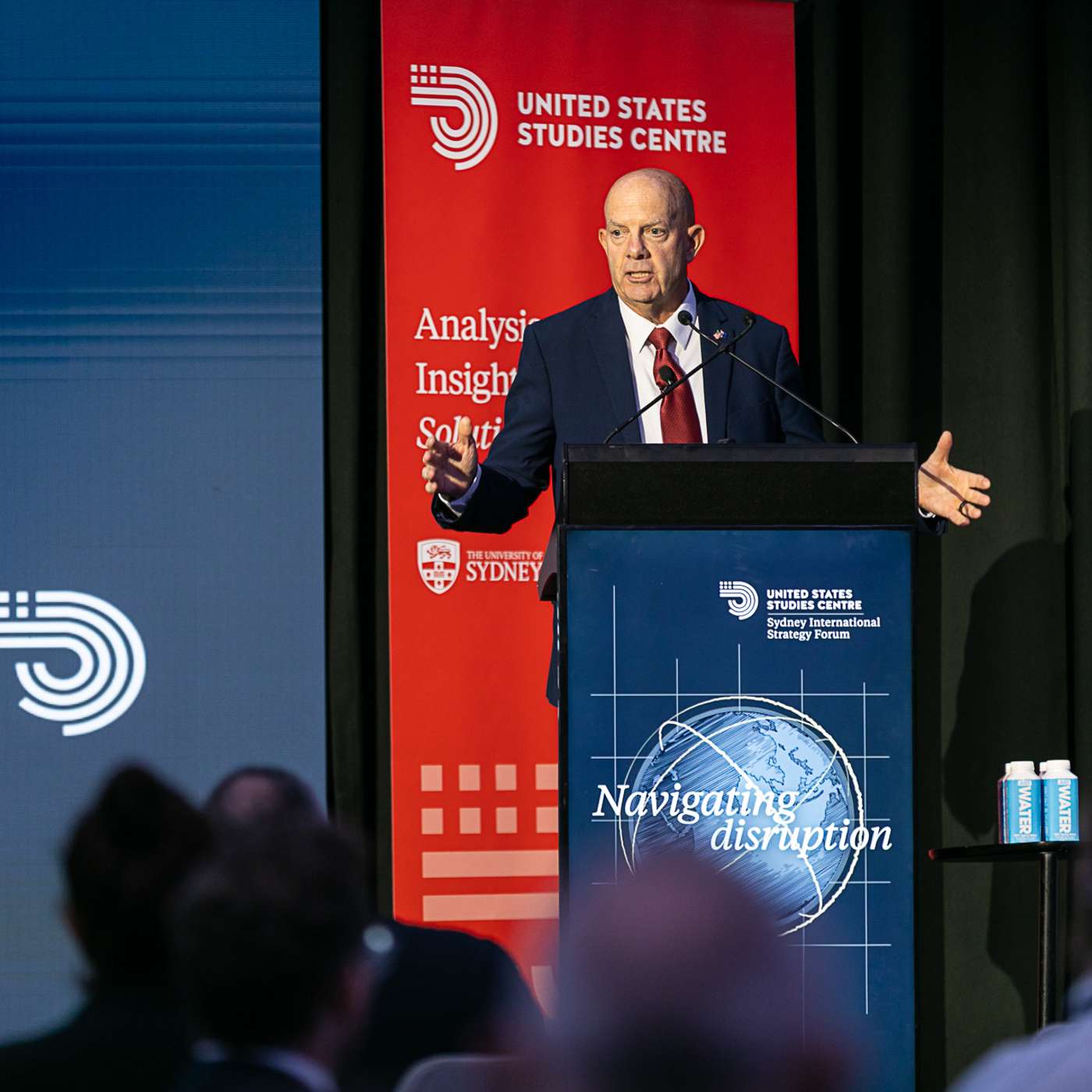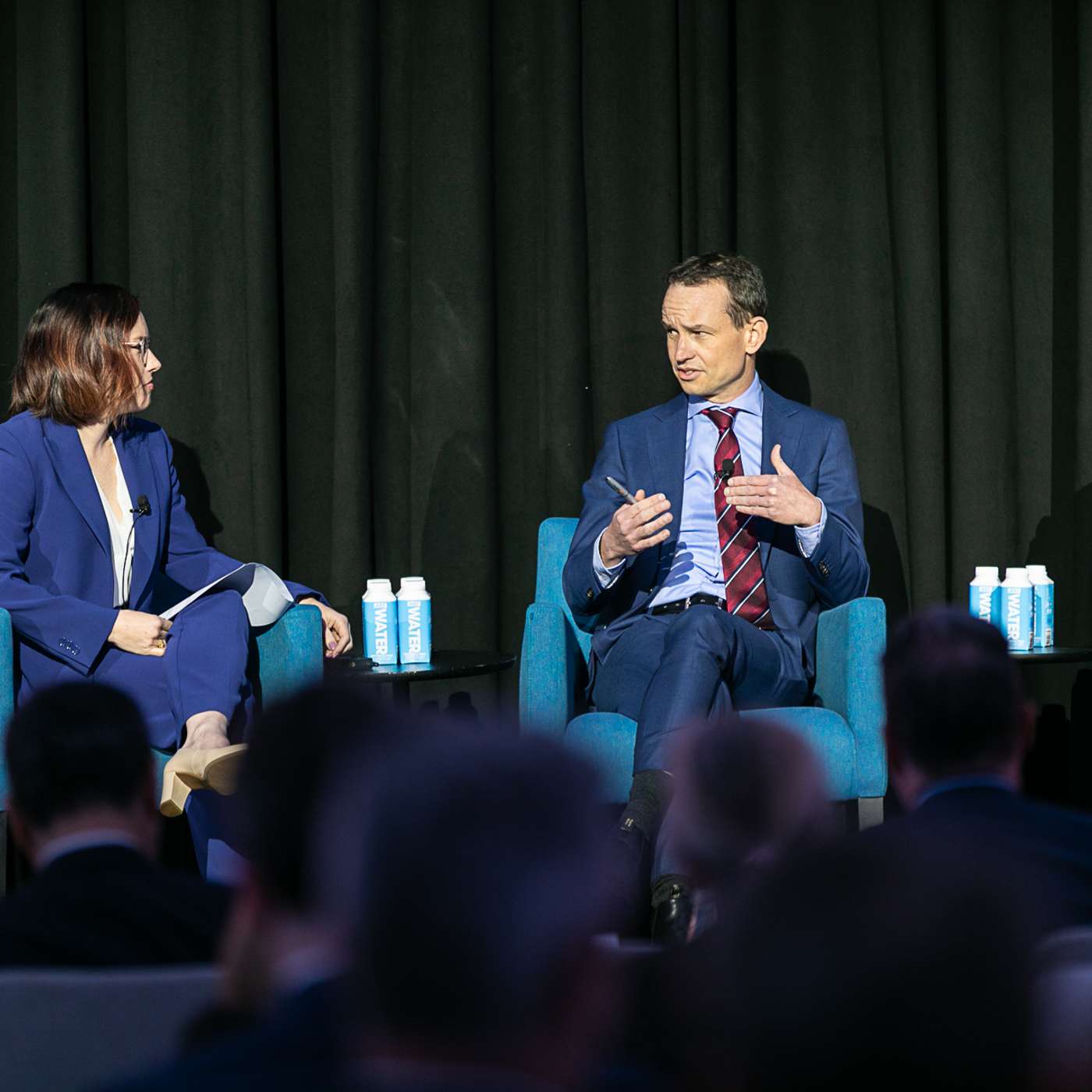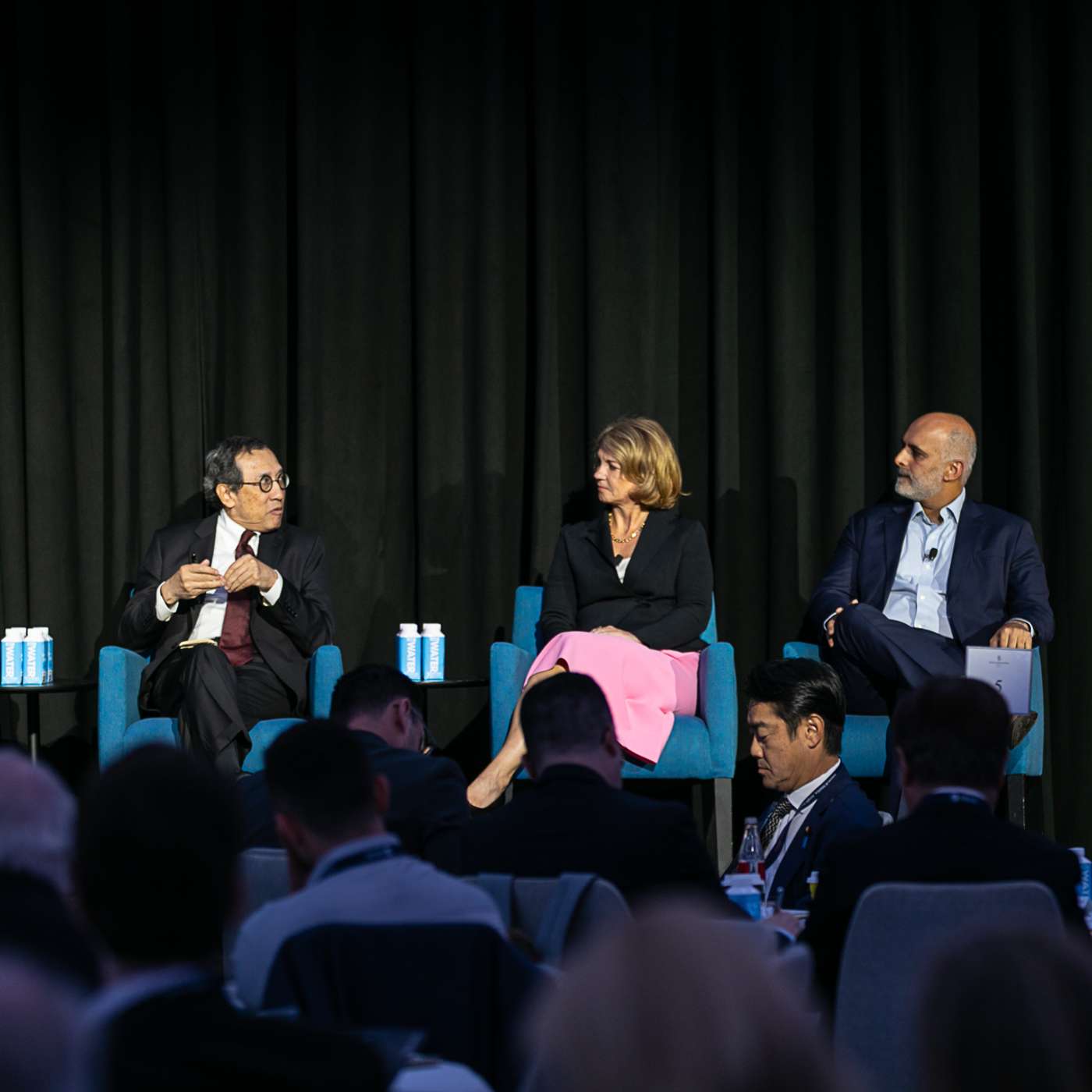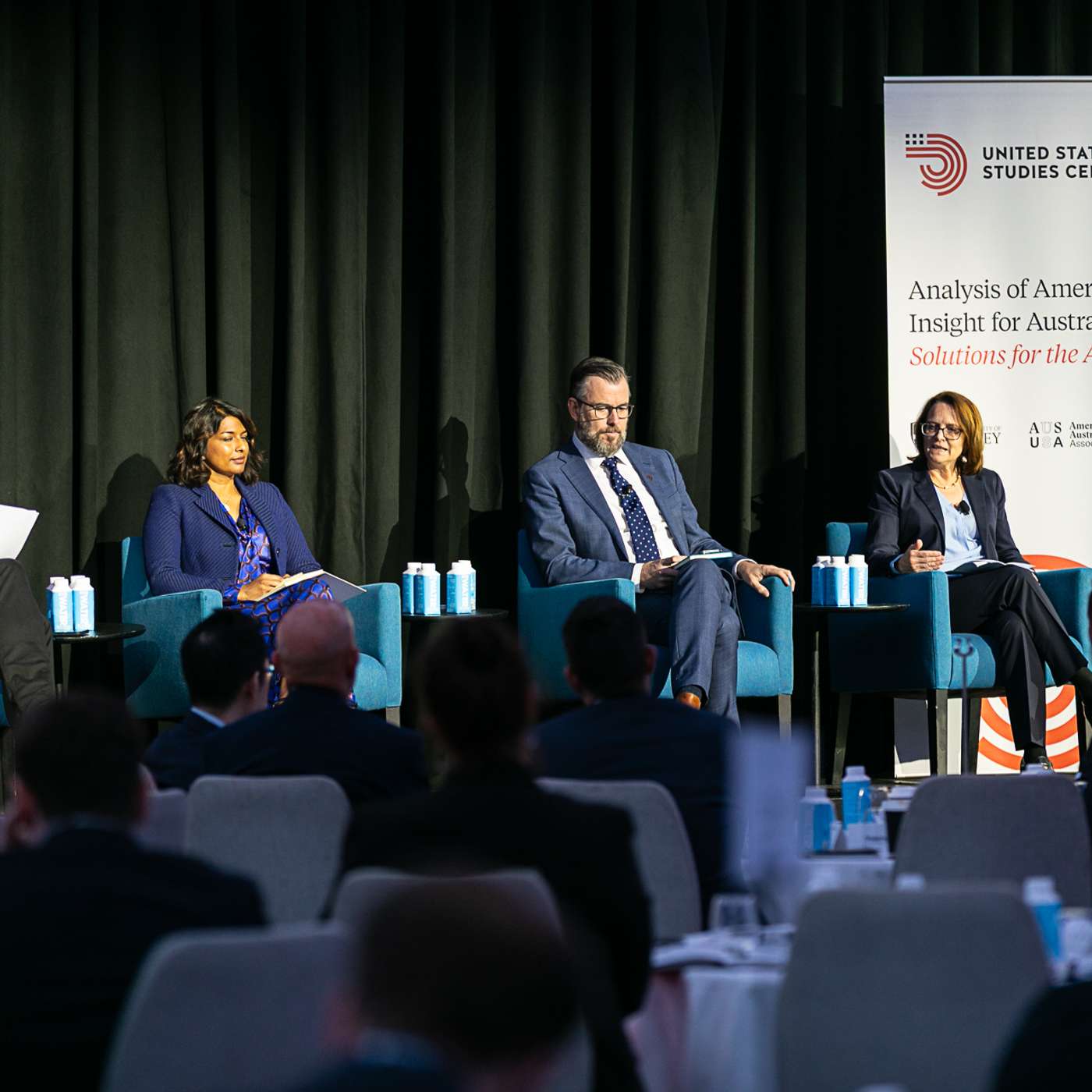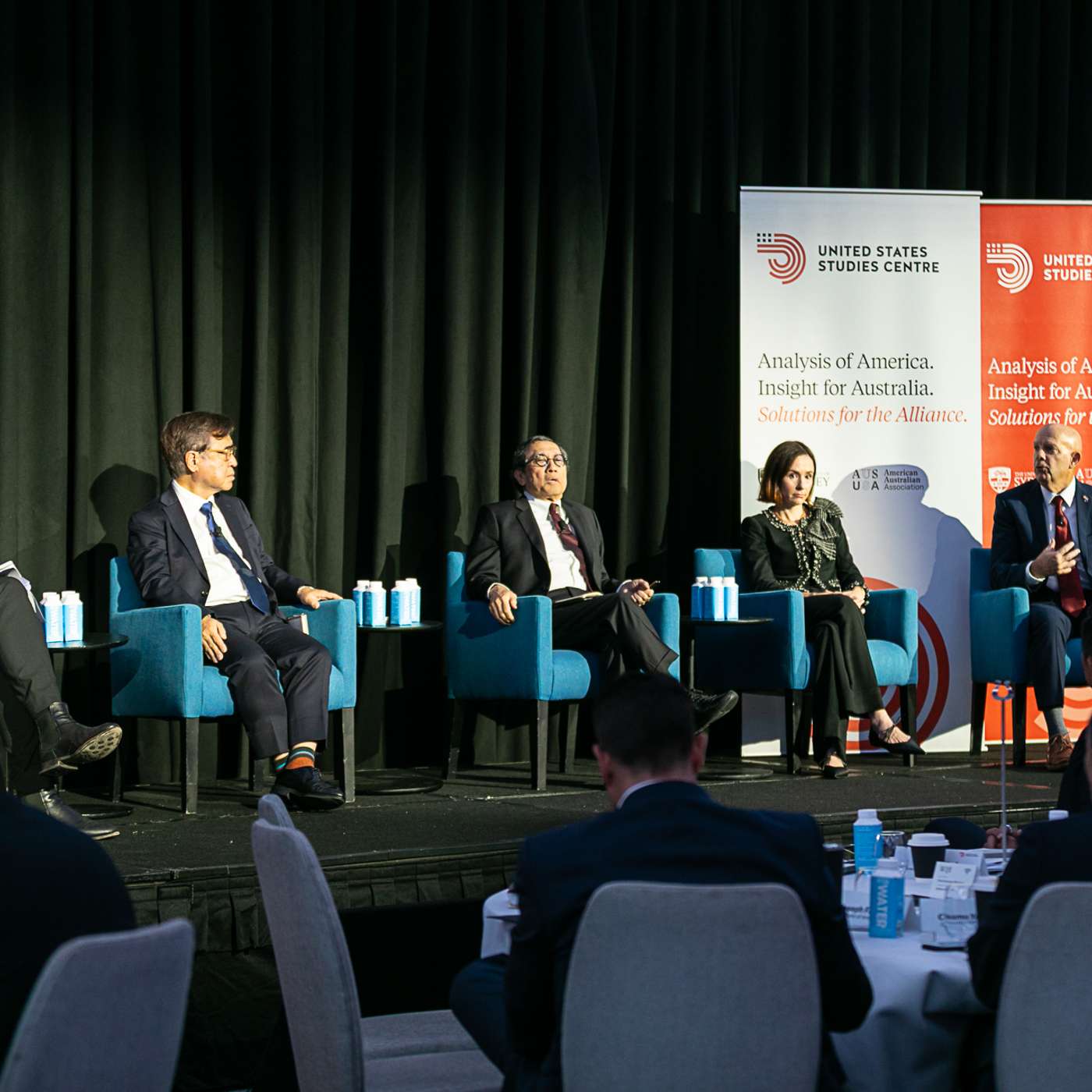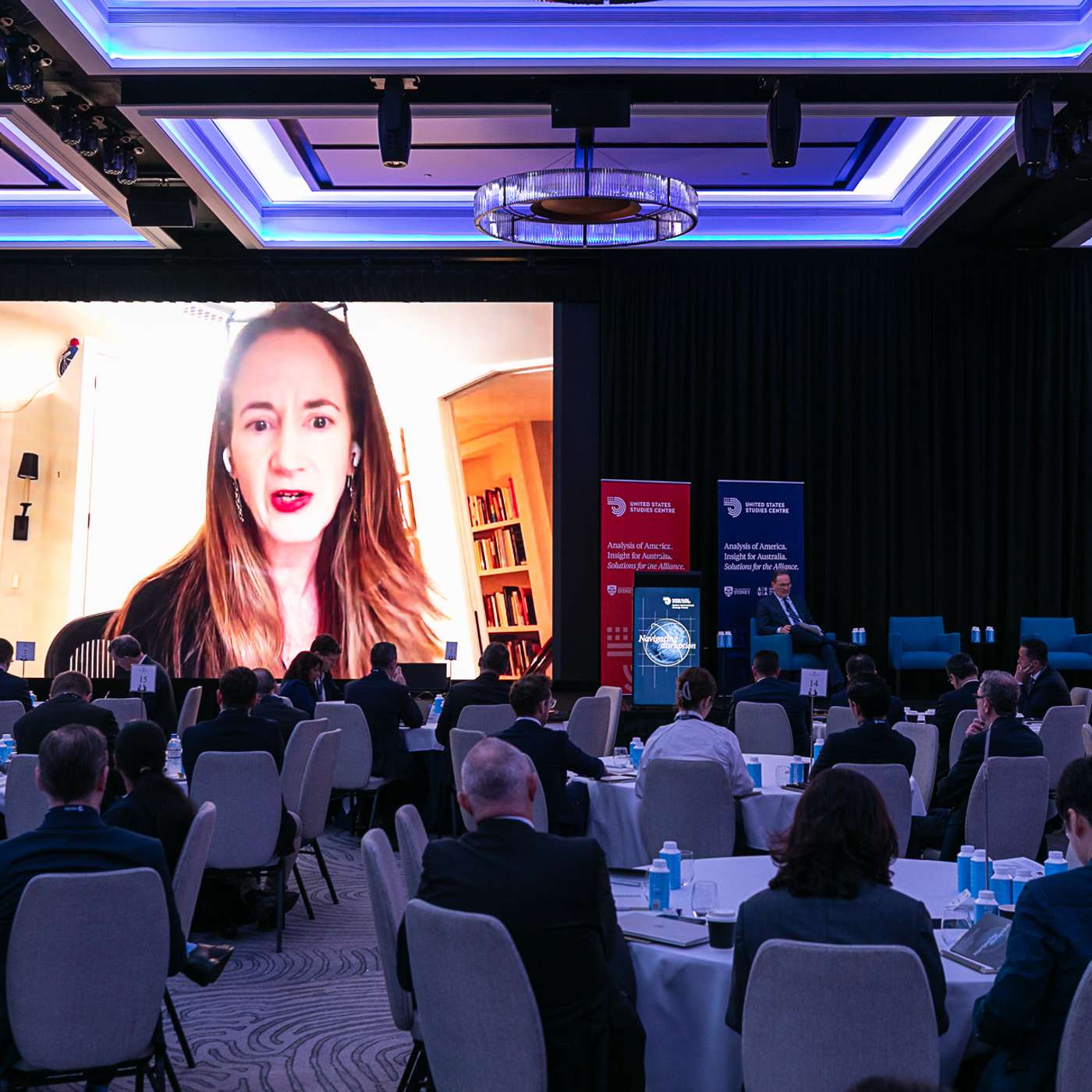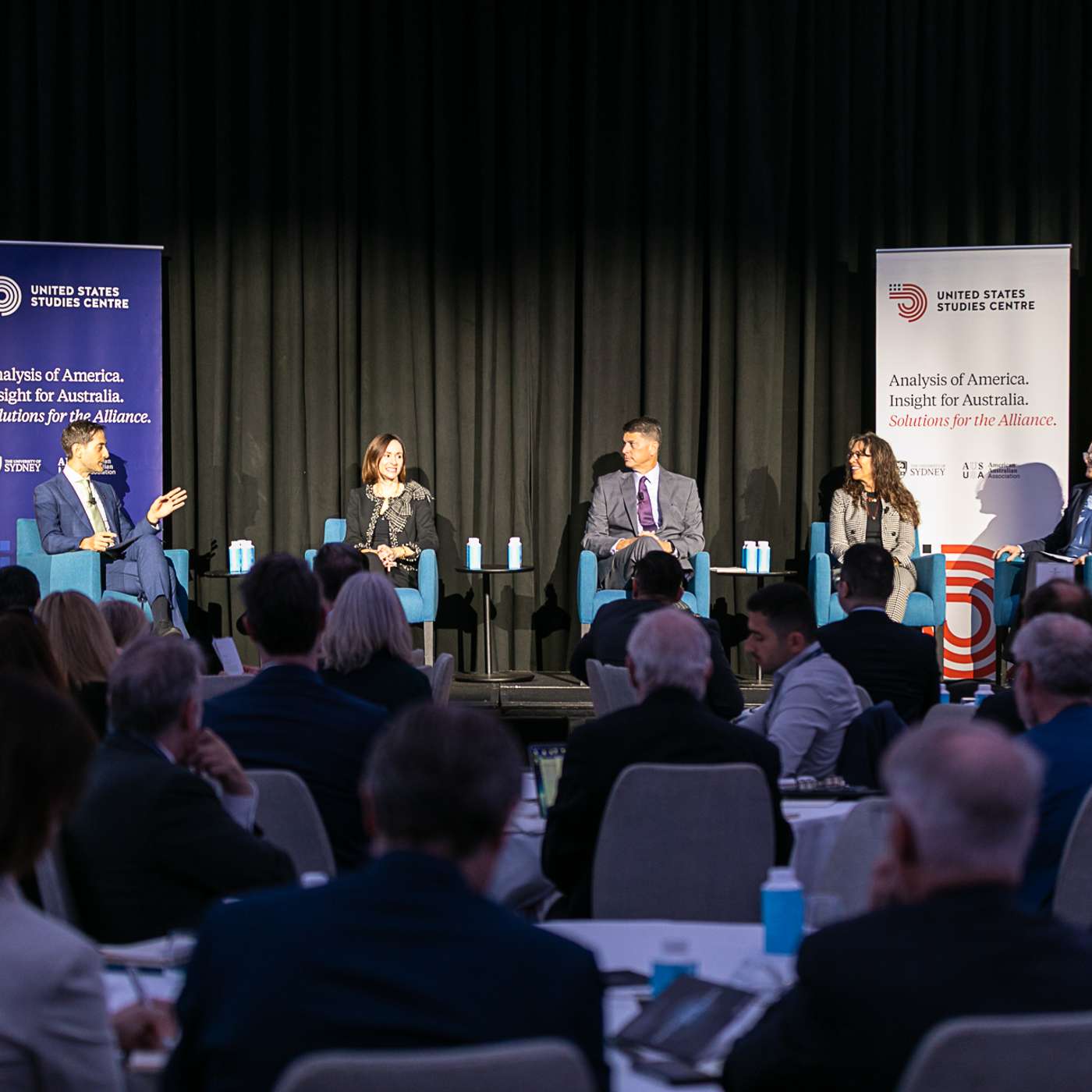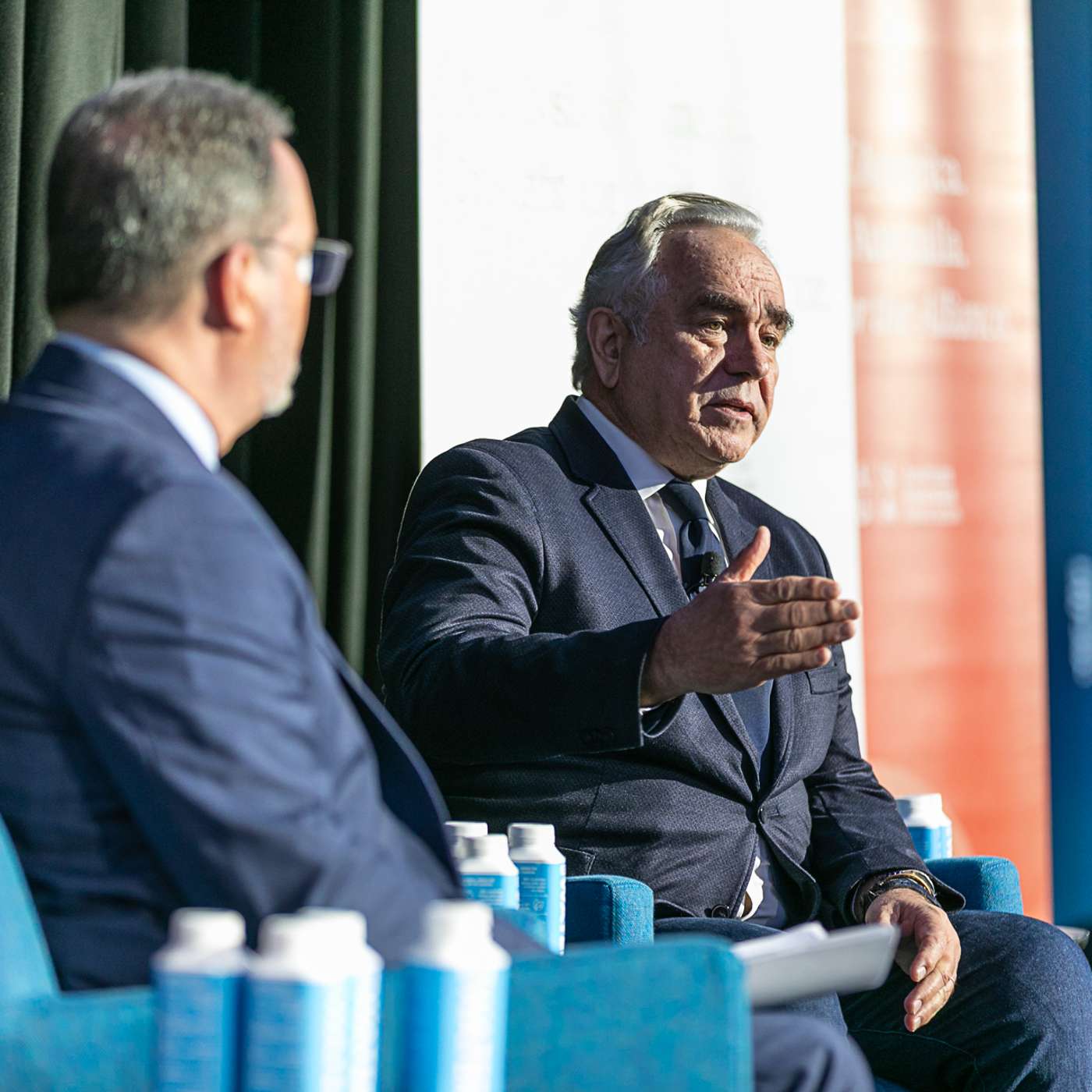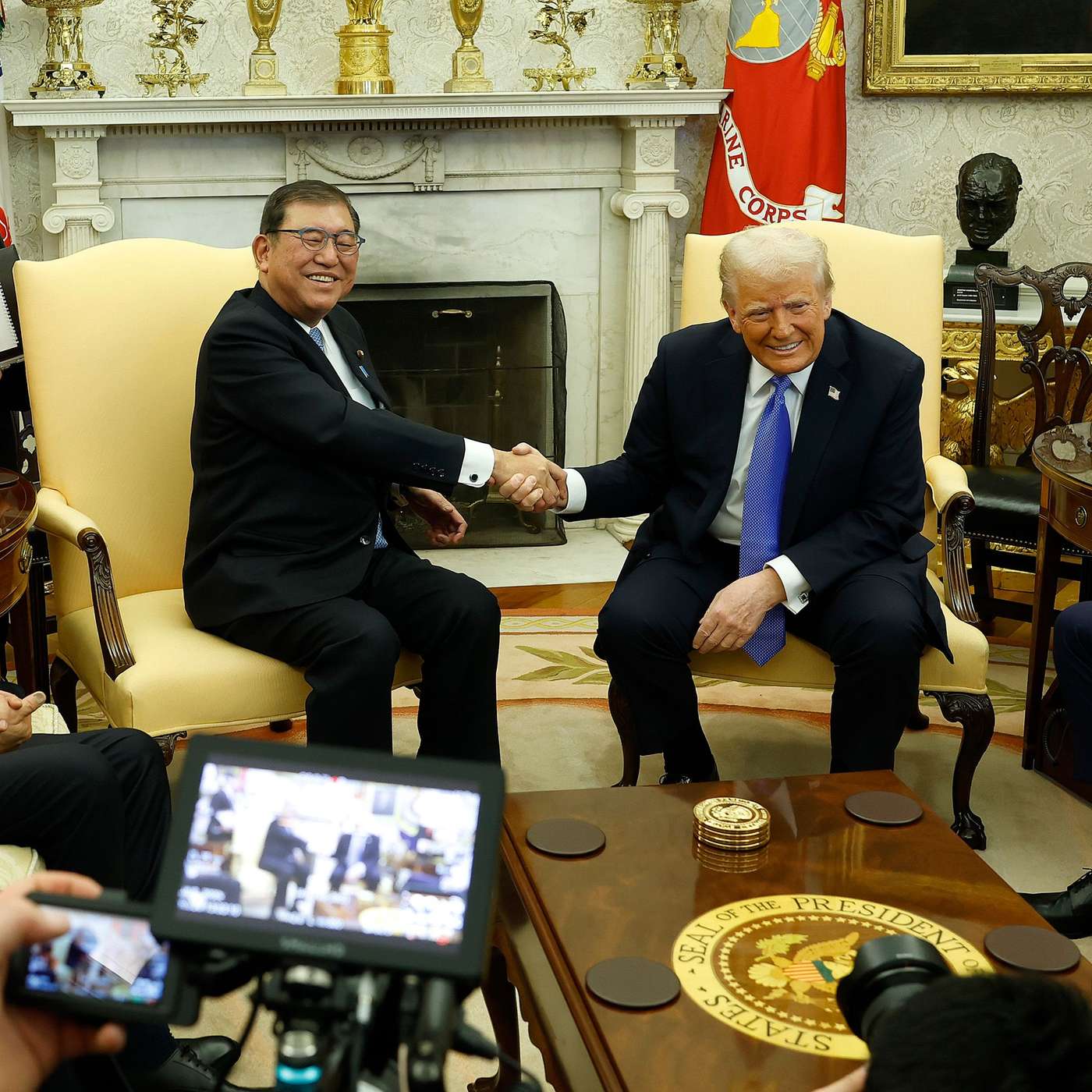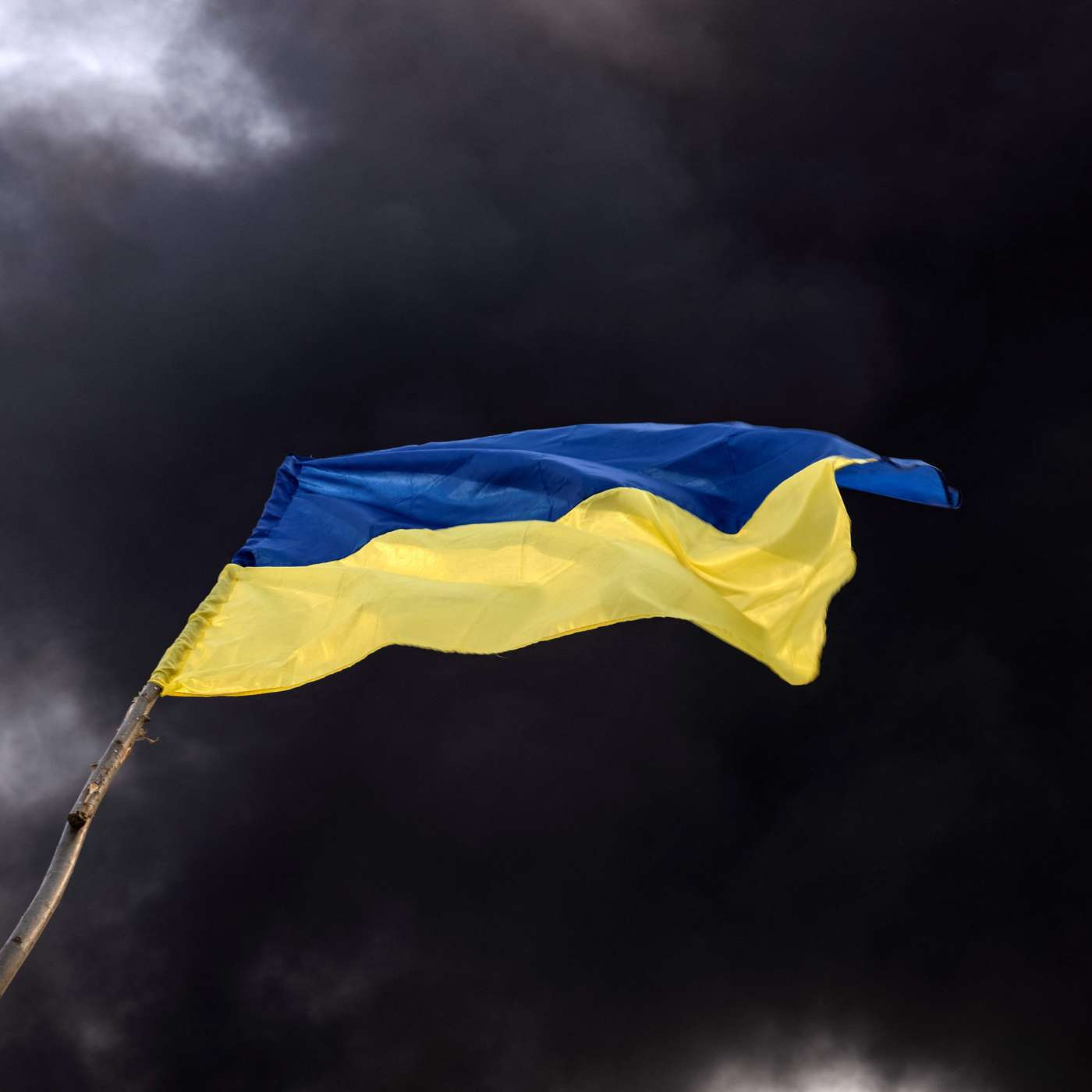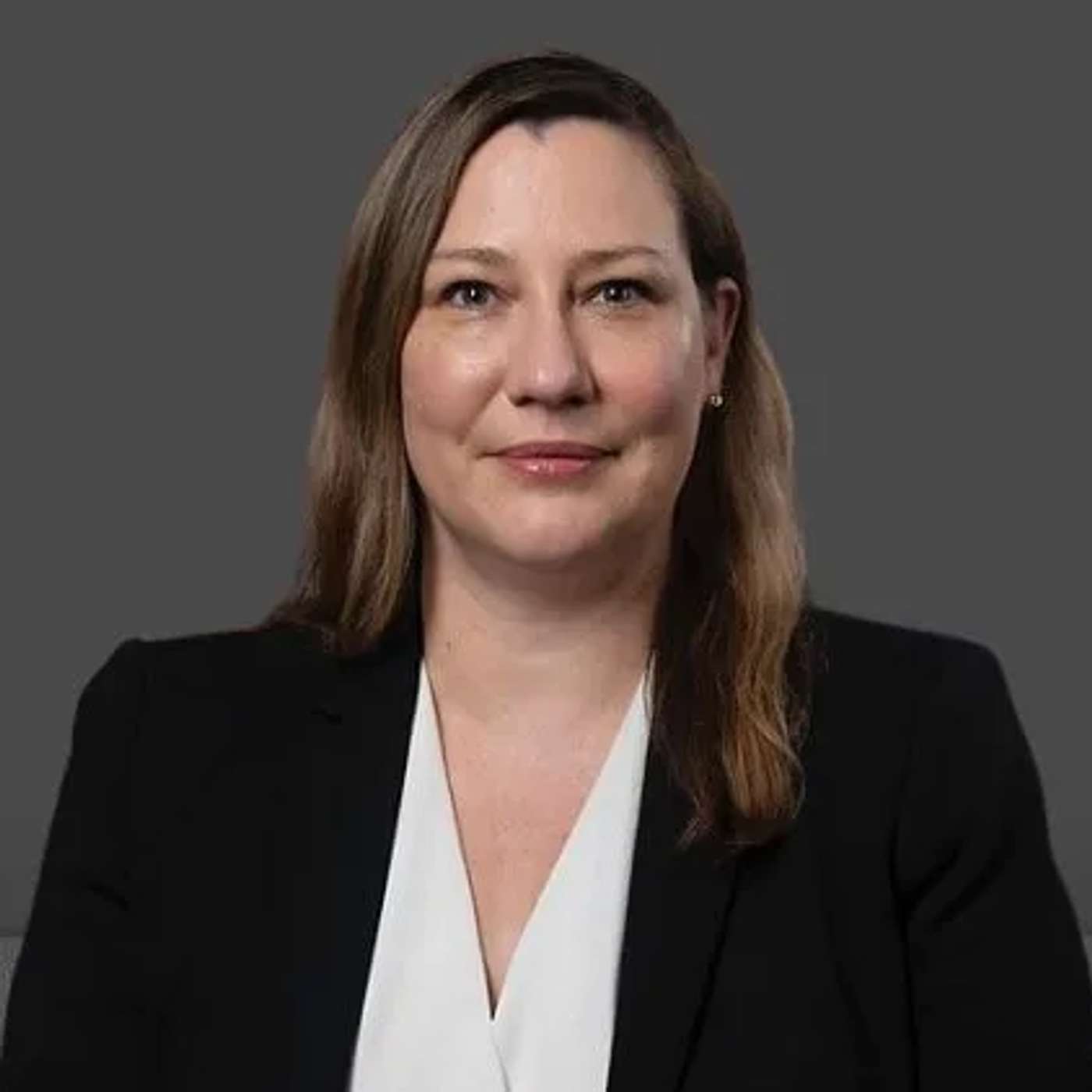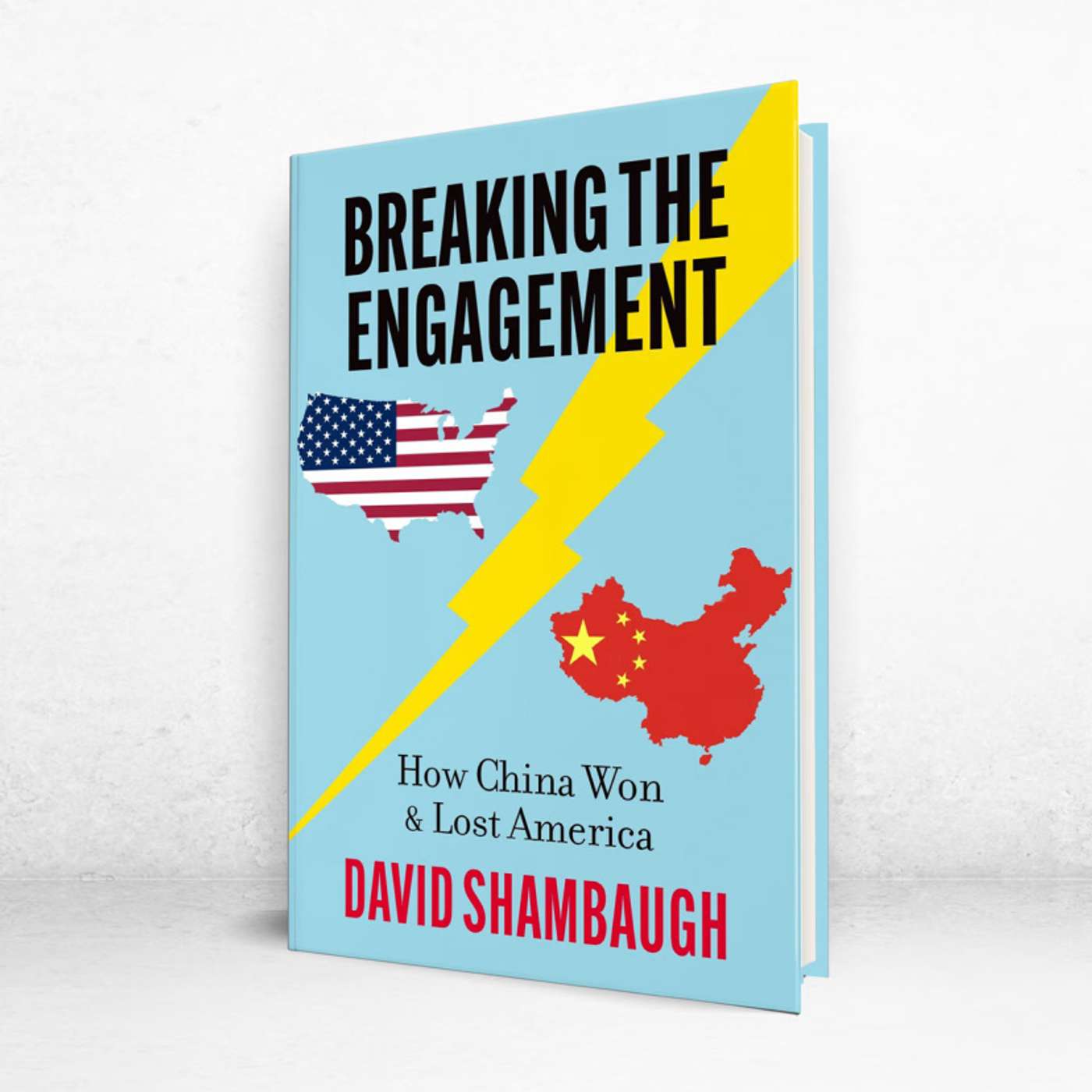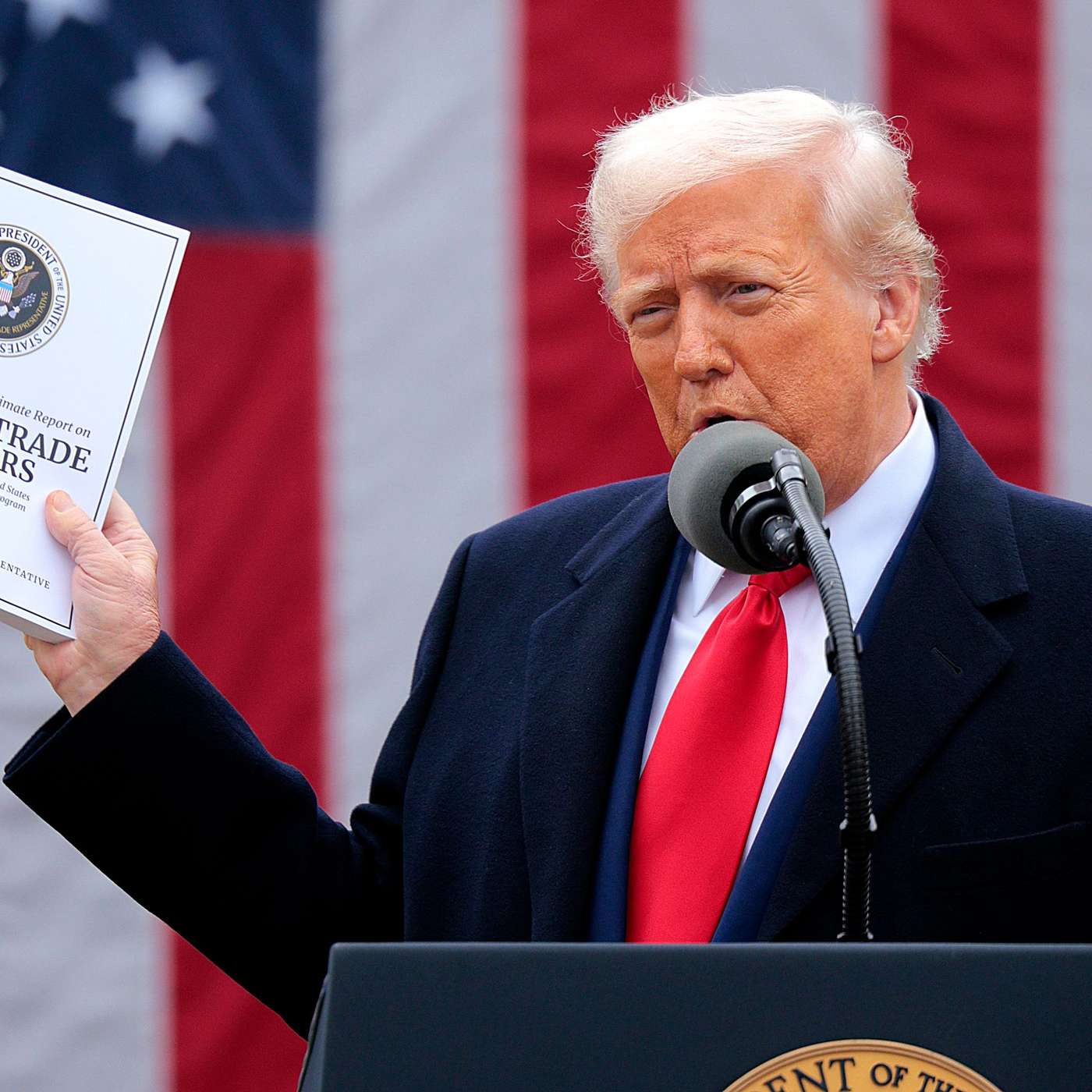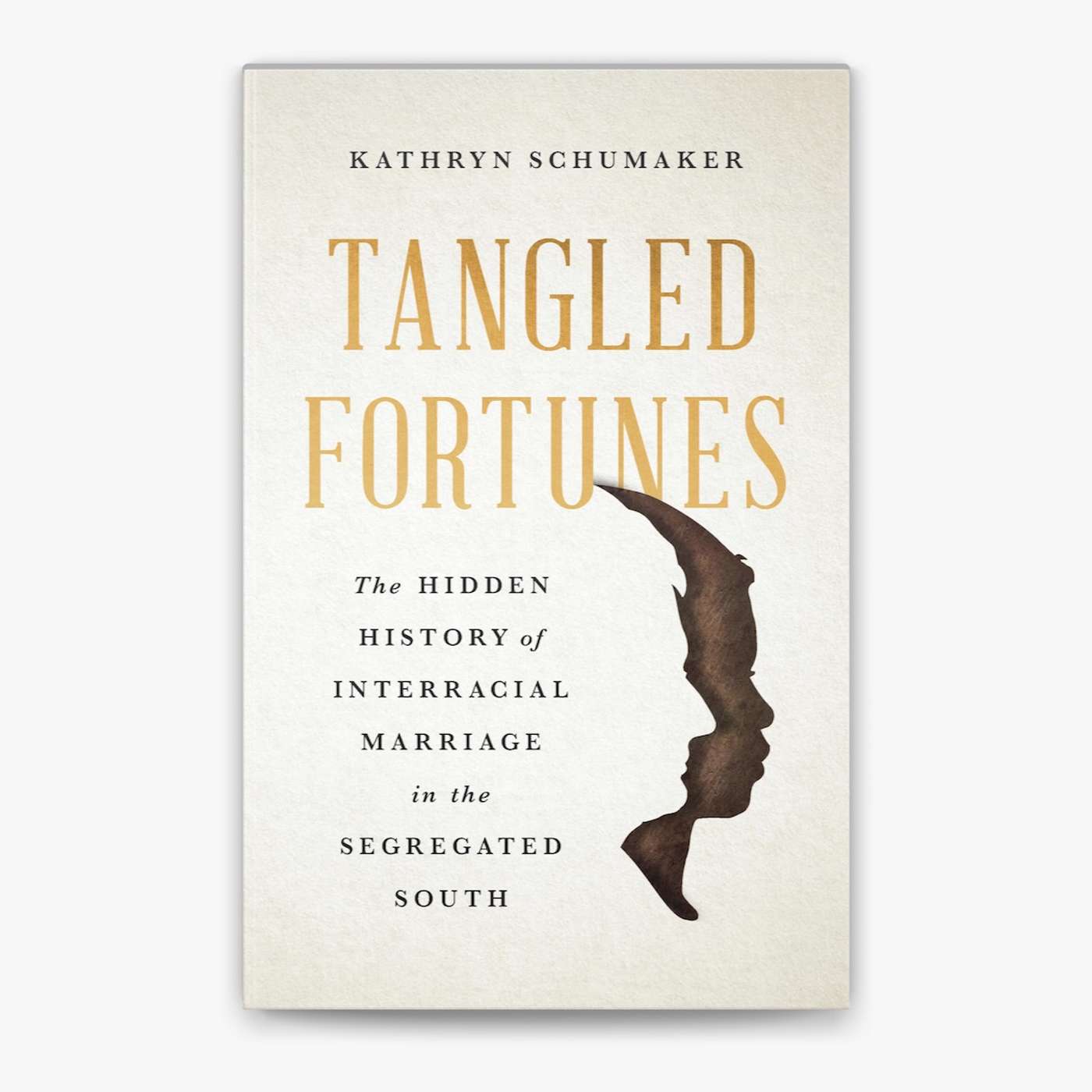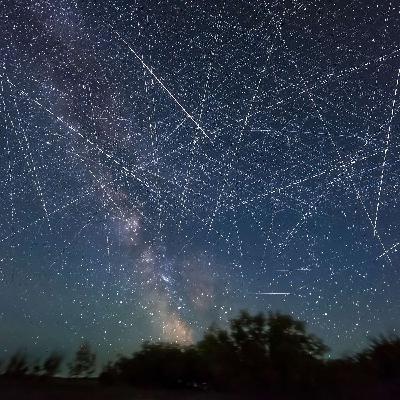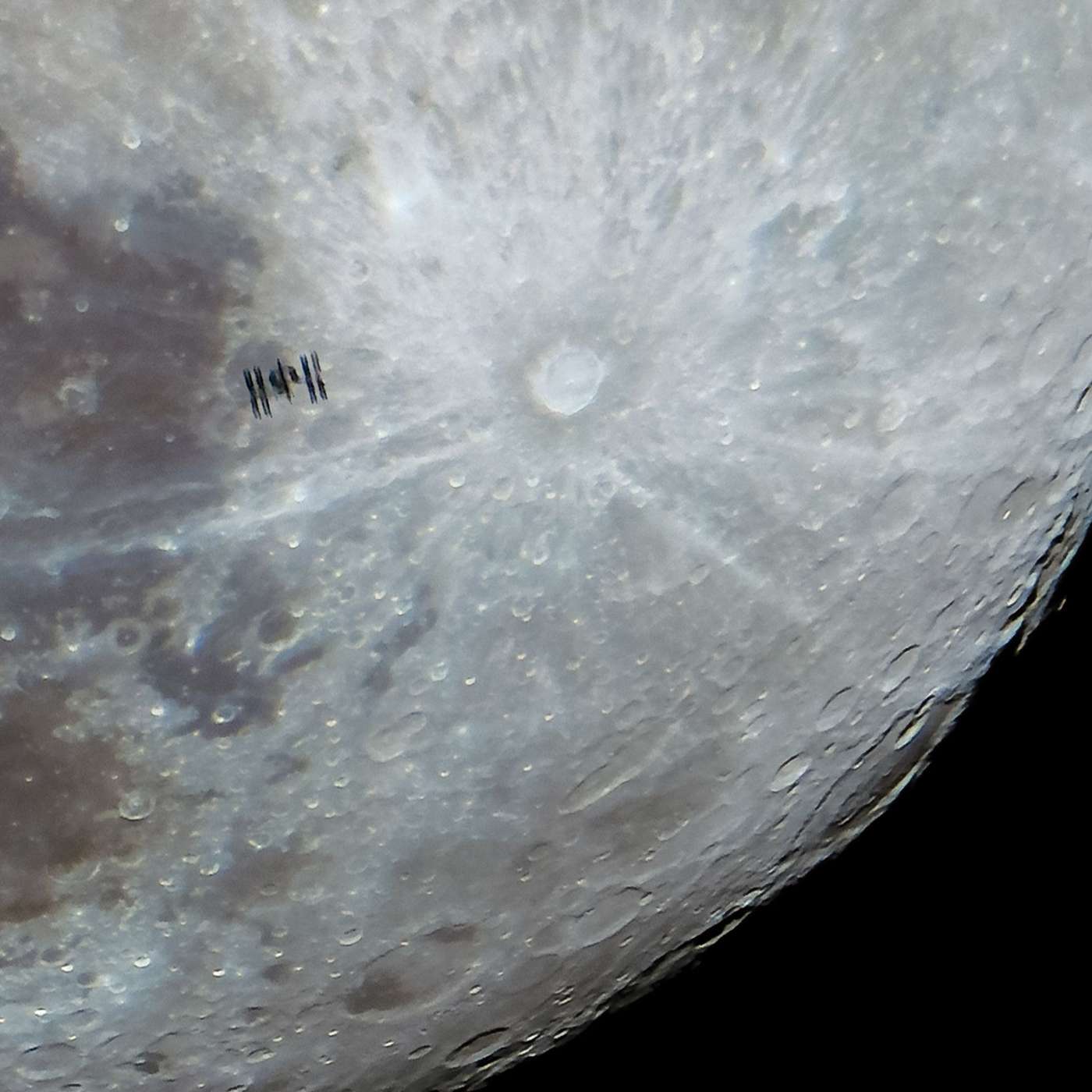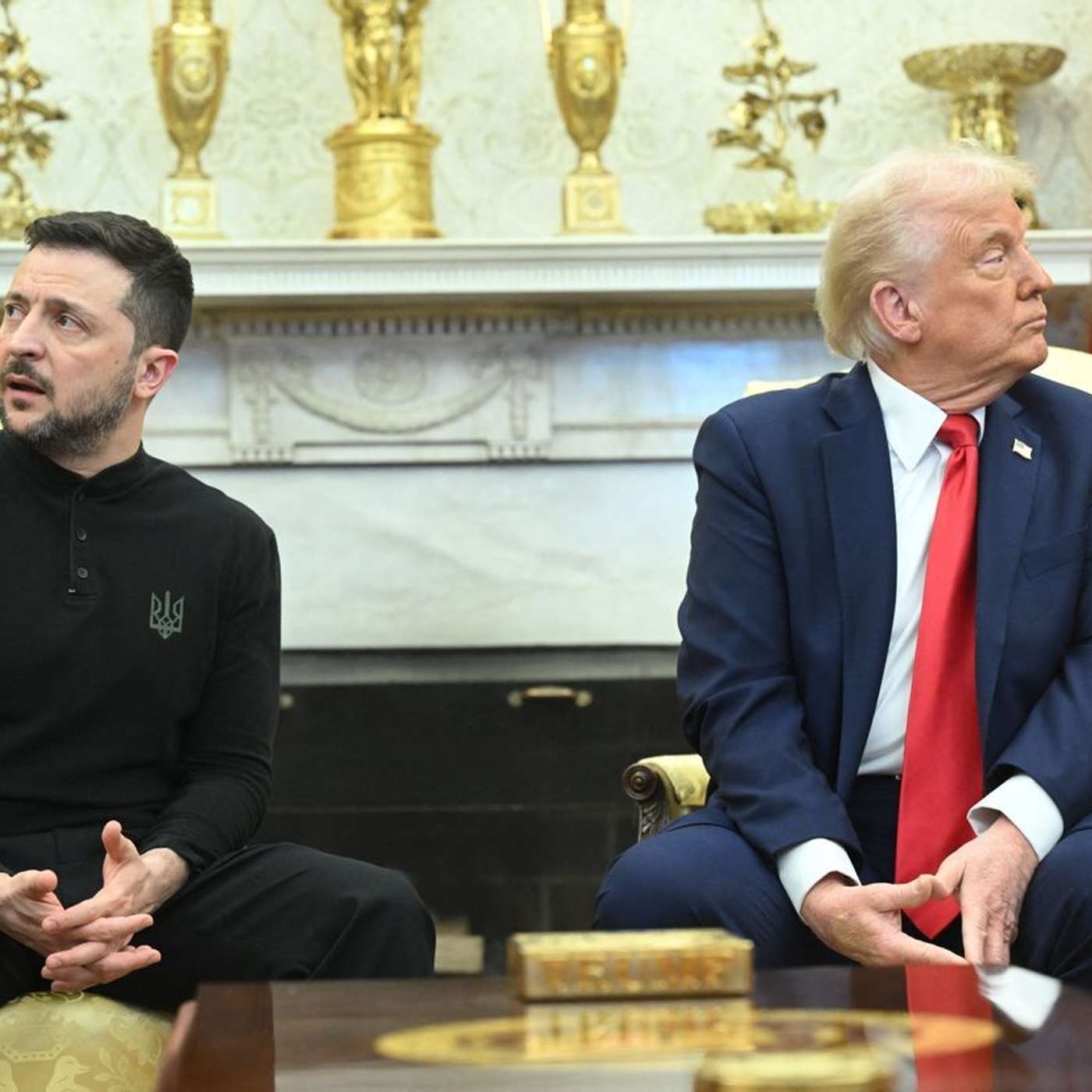Discover USSC Live
USSC Live

USSC Live
Author: The United States Studies Centre
Subscribed: 6Played: 240Subscribe
Share
© United States Studies Centre
Description
Catch up with events produced by the United States Studies Centre at the University of Sydney with USSC Live. These events offer new insights and perspectives on topics including American foreign policy, economics, politics and culture.
225 Episodes
Reverse
Panel discussion at the Sydney International Strategy Forum featuring Dr Kori Schake, Senior Fellow and Director of Foreign and Defense Policy Studies at the American Enterprise Institute, General David Berger (Ret’d), former Commandant in the US Marine Corps, Takashi Yamashita, Member of the Japanese House of Representatives, and The Hon Arthur Sinodinos AO, Chairman of the United States Studies Centre. Moderated by Dr Michael Green, Chief Executive Officer of the United States Studies Centre.About the Sydney International Strategy ForumPresident Donald Trump’s first 100 days featured norm-breaking policies at a breakneck pace, often to be overturned days or weeks later. At the same time, the wars in Ukraine and Gaza have entered new eras with high-level negotiations, on-again off-again fighting and a new world order forming in real time to adapt to a changing strategic landscape. The 2024 trend of turfing incumbents has given way to foreign elections that many perceive to be a referendum on US politics.What is the future of the United States’ role in the world? How can governments and businesses plan in the midst of constant change? How should allies and partners approach security challenges in 2025 and beyond?These are the questions we tackled with international experts across government, business and academia at SISF 2025. They shared their insights on the discussions happening in Washington, Canberra and Tokyo, and what they meant for US allies and partners around the world.https://www.ussc.edu.au/sydney-international-strategy-forum-2025
Keynote address at the Sydney International Strategy Forum from General David Berger (Ret’d), former Commandant of the US Marine Corps on the topic of "Can allies shape US strategy?"About the Sydney International Strategy ForumPresident Donald Trump’s first 100 days featured norm-breaking policies at a breakneck pace, often to be overturned days or weeks later. At the same time, the wars in Ukraine and Gaza have entered new eras with high-level negotiations, on-again off-again fighting and a new world order forming in real time to adapt to a changing strategic landscape. The 2024 trend of turfing incumbents has given way to foreign elections that many perceive to be a referendum on US politics.What is the future of the United States’ role in the world? How can governments and businesses plan in the midst of constant change? How should allies and partners approach security challenges in 2025 and beyond?These are the questions we tackled with international experts across government, business and academia at SISF 2025. They shared their insights on the discussions happening in Washington, Canberra and Tokyo, and what they meant for US allies and partners around the world.https://www.ussc.edu.au/sydney-international-strategy-forum-2025
Panel discussion at the Sydney International Strategy Forum featuring Dr Jeffrey Wilson, Director of Research and Economics at the Australian Industry Group, Yoshiaki Wada, former Representative (2016–24) in the Japanese House of Representatives, and Olivia Shen, Director, Strategic Technologies at the United States Studies Centre. Moderated by Hayley Channer, Director, Economic Security, United States Studies Centre.About the Sydney International Strategy ForumPresident Donald Trump’s first 100 days featured norm-breaking policies at a breakneck pace, often to be overturned days or weeks later. At the same time, the wars in Ukraine and Gaza have entered new eras with high-level negotiations, on-again off-again fighting and a new world order forming in real time to adapt to a changing strategic landscape. The 2024 trend of turfing incumbents has given way to foreign elections that many perceive to be a referendum on US politics.What is the future of the United States’ role in the world? How can governments and businesses plan in the midst of constant change? How should allies and partners approach security challenges in 2025 and beyond?These are the questions we tackled with international experts across government, business and academia at SISF 2025. They shared their insights on the discussions happening in Washington, Canberra and Tokyo, and what they meant for US allies and partners around the world.https://www.ussc.edu.au/sydney-international-strategy-forum-2025
Panel discussion at the Sydney International Strategy Forum featuring Dr John Kunkel, Senior Economics Adviser at the United States Studies Centre, Bilahari Kausikan, former Permanent Secretary at the Ministry of Foreign Affairs in Singapore, Jo Masters, Chief Economist at Barrenjoey Capital Partners, and Ziad Haider, Partner and Global Director of Geopolitics at McKinsey & Company. Moderated by John Kehoe, Economics Editor at The Australian Financial Review.About the Sydney International Strategy Forum President Donald Trump’s first 100 days featured norm-breaking policies at a breakneck pace, often to be overturned days or weeks later. At the same time, the wars in Ukraine and Gaza have entered new eras with high-level negotiations, on-again off-again fighting and a new world order forming in real time to adapt to a changing strategic landscape. The 2024 trend of turfing incumbents has given way to foreign elections that many perceive to be a referendum on US politics. What is the future of the United States’ role in the world? How can governments and businesses plan in the midst of constant change? How should allies and partners approach security challenges in 2025 and beyond? These are the questions we tackled with international experts across government, business and academia at SISF 2025. They shared their insights on the discussions happening in Washington, Canberra and Tokyo, and what they meant for US allies and partners around the world.https://www.ussc.edu.au/sydney-international-strategy-forum-2025
A keynote address at the Sydney International Strategy Forum from His Excellency the Hon Dr Kevin Rudd AC, Australia’s Ambassador to the United States.About the Sydney International Strategy Forum President Donald Trump’s first 100 days featured norm-breaking policies at a breakneck pace, often to be overturned days or weeks later. At the same time, the wars in Ukraine and Gaza have entered new eras with high-level negotiations, on-again off-again fighting and a new world order forming in real time to adapt to a changing strategic landscape. The 2024 trend of turfing incumbents has given way to foreign elections that many perceive to be a referendum on US politics. What is the future of the United States’ role in the world? How can governments and businesses plan in the midst of constant change? How should allies and partners approach security challenges in 2025 and beyond? These are the questions we tackled with international experts across government, business and academia at SISF 2025. They shared their insights on the discussions happening in Washington, Canberra and Tokyo, and what they meant for US allies and partners around the world.https://www.ussc.edu.au/sydney-international-strategy-forum-2025
Panel discussion at the Sydney International Strategy Forum featuring Dr Lavina Lee, Director of Foreign Policy and Defence at the United States Studies Centre, Lisa Curtis, Director of the Indo-Pacific Security Program at the Center for a New American Security, and Professor Peter Dean, Senior Adviser for Defence Strategy at the United States Studies Centre. Moderated by Cameron Stewart, Chief International Correspondent at The Australian. About the Sydney International Strategy Forum President Donald Trump’s first 100 days featured norm-breaking policies at a breakneck pace, often to be overturned days or weeks later. At the same time, the wars in Ukraine and Gaza have entered new eras with high-level negotiations, on-again off-again fighting and a new world order forming in real time to adapt to a changing strategic landscape. The 2024 trend of turfing incumbents has given way to foreign elections that many perceive to be a referendum on US politics. What is the future of the United States’ role in the world? How can governments and businesses plan in the midst of constant change? How should allies and partners approach security challenges in 2025 and beyond? These are the questions we tackled with international experts across government, business and academia at SISF 2025. They shared their insights on the discussions happening in Washington, Canberra and Tokyo, and what they meant for US allies and partners around the world.https://www.ussc.edu.au/sydney-international-strategy-forum-2025
Panel discussion at the Sydney International Strategy Forum featuring General David Berger (Ret’d), former Commandant of the US Marine Corps, Dr Mira Rapp-Hooper, Partner at The Asia Group, Bilahari Kausikan, former Permanent Secretary at the Ministry of Foreign Affairs in Singapore, and Professor Nobukatsu Kanehara, Executive Director of the Sasakawa Peace Foundation. Moderated by Matthew Knott, Foreign Affairs and National Security Correspondent at The Sydney Morning Herald and The Age.About the Sydney International Strategy ForumPresident Donald Trump’s first 100 days featured norm-breaking policies at a breakneck pace, often to be overturned days or weeks later. At the same time, the wars in Ukraine and Gaza have entered new eras with high-level negotiations, on-again off-again fighting and a new world order forming in real time to adapt to a changing strategic landscape. The 2024 trend of turfing incumbents has given way to foreign elections that many perceive to be a referendum on US politics.What is the future of the United States’ role in the world? How can governments and businesses plan in the midst of constant change? How should allies and partners approach security challenges in 2025 and beyond?These are the questions we tackled with international experts across government, business and academia at SISF 2025. They shared their insights on the discussions happening in Washington, Canberra and Tokyo, and what they meant for US allies and partners around the world.https://www.ussc.edu.au/sydney-international-strategy-forum-2025
Former Director of National Intelligence Avril Haines joined the Sydney International Strategy Forum live by video link to discuss with Chief Executive Officer of the United States Studies Centre, Dr Michael Green, the topic, "Is China winning in the Indo-Pacific?" About the Sydney International Strategy Forum President Donald Trump’s first 100 days featured norm-breaking policies at a breakneck pace, often to be overturned days or weeks later. At the same time, the wars in Ukraine and Gaza have entered new eras with high-level negotiations, on-again off-again fighting and a new world order forming in real time to adapt to a changing strategic landscape. The 2024 trend of turfing incumbents has given way to foreign elections that many perceive to be a referendum on US politics. What is the future of the United States’ role in the world? How can governments and businesses plan in the midst of constant change? How should allies and partners approach security challenges in 2025 and beyond? These are the questions we tackled with international experts across government, business and academia at SISF 2025. They shared their insights on the discussions happening in Washington, Canberra and Tokyo, and what they meant for US allies and partners around the world.https://www.ussc.edu.au/sydney-international-strategy-forum-2025
Panel discussion featuring Lisa Curtis, Director of the Indo-Pacific Security Program at the Center for a New American Security, Dr Mira Rapp-Hooper, Partner at The Asia Group, Dr Kori Schake, Senior Fellow and Director of Foreign and Defense Policy Studies at the American Enterprise Institute, and Clay Lowery, Executive Vice President for Research and Policy at the Institute of International Finance. Moderated by Jared Mondschein, Director of Research, United States Studies Centre. About the Sydney International Strategy Forum President Donald Trump’s first 100 days featured norm-breaking policies at a breakneck pace, often to be overturned days or weeks later. At the same time, the wars in Ukraine and Gaza have entered new eras with high-level negotiations, on-again off-again fighting and a new world order forming in real time to adapt to a changing strategic landscape. The 2024 trend of turfing incumbents has given way to foreign elections that many perceive to be a referendum on US politics. What is the future of the United States’ role in the world? How can governments and businesses plan in the midst of constant change? How should allies and partners approach security challenges in 2025 and beyond? These are the questions we tackled with international experts across government, business and academia at SISF 2025. They shared their insights on the discussions happening in Washington, Canberra and Tokyo, and what they meant for US allies and partners around the world.https://www.ussc.edu.au/sydney-international-strategy-forum-2025
To open the 2025 Sydney International Strategy Forum, former US Deputy Secretary of State, Chairman and Co-Founder, The Asia Group, Dr Kurt Campbell, spoke with Chief Executive Officer of the United States Studies Centre, Dr Michael Green. About the Sydney International Strategy ForumPresident Donald Trump’s first 100 days featured norm-breaking policies at a breakneck pace, often to be overturned days or weeks later. At the same time, the wars in Ukraine and Gaza have entered new eras with high-level negotiations, on-again off-again fighting and a new world order forming in real time to adapt to a changing strategic landscape. The 2024 trend of turfing incumbents has given way to foreign elections that many perceive to be a referendum on US politics. What is the future of the United States’ role in the world? How can governments and businesses plan in the midst of constant change? How should allies and partners approach security challenges in 2025 and beyond? These are the questions we tackled with international experts across government, business and academia at SISF 2025. They shared their insights on the discussions happening in Washington, Canberra and Tokyo, and what they meant for US allies and partners around the world.https://www.ussc.edu.au/sydney-international-strategy-forum-2025
Russian disinformation and foreign influence campaigns have increasingly become defining features of today’s information landscape. Their reach extends beyond Ukraine, shaping debates around the globe, including in the United States, Southeast Asia, and Australia.With democratic trust and resilience under increasing strain, this event will explore:The tactics and narratives commonly used in Russian disinformation campaigns.The impact of these campaigns across different regions.How governments, civil society, and communities can strengthen resilience against foreign influence.To discuss these questions, USSC hosted an expert discussion featuring Ukrainian Ambassador to Australia, His Excellency Vasyl Myroshnychenko, ex-career diplomat and strategic communications specialist, Natalia Solieva, and University of Sydney Senior Lecturer in Digital Cultures, Dr Olga Boichak, moderated by USSC Director of Strategic Technologies, Olivia Shen.
A panel of experts unpacked Japan’s National Security Strategy and explored the opportunities and challenges for Australia-Japan-US trilateral strategic cooperation under Trump 2.0. The panel featured two prominent strategic thinkers from the US and Japan.Few countries have done more to reorganise themselves for a new era of strategic competition in the Indo-Pacific than Japan. Building on the strategic vision of former Prime Minister Shinzo Abe, Japan’s 2022 National Security Strategy, National Defense Strategy, and Defense Build-Up Plan provided a new framework for Japan to assume a more active and assertive role in regional security affairs. Since then, successive Japanese leaders have introduced new pieces of legislation, strengthened key national security institutions, increased national defence spending, and expanded Japan’s defence partnerships with the United States and Australia, including trilaterally, to address an increasingly volatile regional and global security environment.The logic of such cooperation remains sound even with the second coming of Donald Trump. Yet even trusted US allies like Japan and Australia are facing difficulties and uncertainty in their relationships with Washington. The threat of tariffs, demands for increased defence spending, reviews of marquee initiatives like AUKUS, and the dismantling of key US national security and diplomatic agencies all pose challenges to Australia, Japan and trilateral cooperation.How have Japan’s security policies developed in recent years? What more must be done to fully implement those changes? How are Australia and Japan navigating their relationships with Trump 2.0? Where is the trilateral defence partnership headed?To discuss these questions, USSC hosted a panel discussion featuring Yuki Tatsumi, Senior Director at the Institute for Indo-Pacific Security; Hirohito Ogi, Senior Research Fellow with the Institute of Geoeconomics at the International House of Japan, and Tom Corben, Research Fellow in the Foreign Policy and Defence Program at the USSC, moderated by USSC Professor and CEO Dr Michael Green.This event was part of the United States Studies Centre’s Assessing Implementation of Abe’s National Security Strategy supported by the Smith Richardson Foundation.
Three years since Russia’s invasion of Ukraine, the second Trump administration has made sweeping changes to US foreign policy priorities and moved to limit US support for Ukraine. In the last six months, the world has seen an explosive Oval Office meeting between President Trump and President Zelenskyy, NATO states pledging to increase their defence spending to as much as 5% of GDP, and continued Russian attacks on Ukraine. With future US support for Ukraine appearing to be uncertain, key questions about Ukraine’s future arise:Beyond budget pledges, how will European states respond to US demands for them to step up their defence contributions to Ukraine?What role should Australia play in the ongoing conflict?What will the second Trump administration mean for Ukraine’s future?To discuss these questions, the USSC hosted a panel discussion featuring USSC Senior Lecturer Dr Gorana Grgić, University of Sydney Senior Lecturer Dr Olga Boichak, and Griffith Asia Institute Associate Professor (Adjunct) Dr Matthew Sussex, moderated by USSC Director of Research Jared Mondschein.The event began with a virtual address by Ukrainian Ambassador to Australia His Excellency Vasyl Myroshnychenko.
The transition to a new US Administration has sharpened Washington’s focus on the Indo-Pacific, while also exposing deep strategic and political tensions shaping the future of American foreign and defence policy.Competing pressures — between isolationism and interventionism, reassurance and burden-sharing with allies, and fiscal restraint versus demands for force modernisation and advanced capabilities like ‘Golden Dome’ — are creating uncertainty around how the US will deter what Secretary of Defense Pete Hegseth has called China’s “imminent threat” to Taiwan.These tensions raise urgent questions: How has (and hasn’t) the US approach to deterrence in the Indo-Pacific changed under the new Administration? Are US forces adequately postured to support US regional interests and alliance commitments? Where are the major fault lines in US regional strategy, and what do they mean for the future of regional security and US influence in the Indo-Pacific?To unpack these issues, the United States Studies Centre hosted a fireside chat with Kelly Magsamen, former Chief of Staff to Secretary of Defense Lloyd Austin and Senior Advisor at The Asia Group. The conversation was moderated by Professor Peter Dean, Director of Foreign Policy and Defence at the United States Studies Centre.This event is part of the United States Studies Centre's ‘Next Generation Leaders in the Australia-US Alliance’ project which is supported by funding from the US State Department.
For more than five decades following the 1972 rapprochement between the United States and China, the two countries seemed to be steadily building a sound relationship, even accounting for periodic setbacks like the Tiananmen Square massacre.The last decade, though, has seen a sharp increase in tensions and a complete reorientation of US policies toward China — from “engagement” to “competition.” Australia, too, has changed its approach to its largest trading partner.What happened? Where is strategic competition heading? And what should US allies like Australia know?This United States Studies Centre event featured Professor David Shambaugh, a world-renowned China scholar and author of “Breaking the Engagement: How China Won and Lost America”.
The future of the global economic order is in flux. Beijing's coercive economic policies, President Trump’s unprecedented tariffs, and the embrace of industrial policies around the world have cast doubt on the future of international economic rules. Globally, countries like Australia are being forced to contend with a more fragmented economic landscape that is affecting trade and technology flows, supply chains, multilateral institutions, and relations with the major powers.In this era of unpredictability, critical questions arise:Where are Trump's tariffs heading and how will they impact US economic relations and the United States as a place to do business?Are the US and China heading for economic decoupling?How should countries like Australia, Japan, South Korea, and India navigate great power competition and economic pressure?What is the impact on alliance relations?What role will minilateral and regional groups play in shaping a post-tariff global order?These questions were discussed by leading expert in diplomacy and economic affairs in East Asia, Ambassador Kurt Tong and USSC CEO, Dr Michael J. Green, at a public event moderated by USSC Director of Economic Security Hayley Channer.
To launch USSC senior lecturer Dr Kathryn Schumaker's new book, Tangled Fortunes: The Hidden History of Interracial Marriage in the Jim Crow South (Basic Books, 2025), Dr Schumaker was joined by scholars Dr Michael Green, Associate Professor Frances Clarke, and Dr Aaron Nyerges to discuss the themes of the book.Prior to the US Supreme Court’s 1967 ruling in Loving v. Virginia, most American states prohibited interracial marriages at one time or another. But as Dr Schumaker reveals in Tangled Fortunes, such laws did not effectively prevent interracial marriages. Indeed, enforcement of such laws was inconsistent when it came to relationships between white men and Black women. In some Southern communities, such unions were tolerated – though often subject to social disapproval. The book offers a new narrative of the rise and fall of racial segregation from the perspectives of ordinary people whose primary goal was to keep their families together in the face of great difficulty.Read the Wall Street Journal review of Tangled Fortunes.
Out of sight, out of mind. Low Earth Orbit has undeniably become busier, with upwards of 10,000 satellites and millions of pieces of space debris currently in orbit. With vital services—ranging from communications to climate monitoring, national defence, and financial services—increasingly reliant on space, the proliferation of space assets and debris, and the associated risks of collisions, explosions, and anti-satellite warfare have become a major political issue.Countries have developed new tools and cultivated norms to improve traffic management and space sustainability. However, amid a proliferation of space stakeholders; the absence of binding international agreements; and challenges in monitoring activities in space, significant gaps remain.How are public and private actors navigating the challenges of growing congestion in space? How can international frameworks like the Outer Space Treaty be strengthened to address these risks? And how can space sustainability be integrated into the national security policy debate?To address these questions, the United States Studies Centre was pleased to host a webinar with Audrey M. Schaffer. Ms Schaffer is an internationally recognised expert in space policy, currently serving as Vice President of Strategy and Policy at Slingshot Aerospace and Non-Resident Senior Associate with the Aerospace Security Project at the Center for Strategic and International Studies. She previously served in the US government for over 15 years, holding positions in the Executive Office of the President, Department of Defense, Department of State, and National Aeronautics and Space Administration (NASA). Ms Schaffer led the US delegation that negotiated the UN Guidelines for Space Sustainability and, from 2021–23, served as Director for Space Policy on the National Security Council of the Biden-Harris Administration.This webinar was hosted by Dr Kathryn Robison, Lecturer in American Studies at the United States Studies Centre and Senior Research Fellow at the Australian Centre for Space Governance.This event was made possible with funding from the US State Department.
As space technologies proliferate and international political competition heats up, space has become a hotly contested strategic and operational domain. The rise of space-related threats, from increased orbital congestion to the proliferation of anti-satellite (ASAT) weapons now threatens to upend the international balance of power and drive crisis instability and arms racing between the world’s major powers.What are the strategic implications of the militarisation of space? How have space threats evolved since the Cold War ‘Space Race’? What measures exist to safeguard critical space infrastructure and to manage space traffic? And how are space-based threats reflected in Australian policy and strategic thinking?To discuss these issues, the United States Studies Centre hosted a panel featuring the following experts:Audrey Schaffer, an internationally recognised expert in space policy and former Director for Space Policy on the National Security Council staff. Ms Schaffer is currently the Vice President of Strategy and Policy at Slingshot Aerospace and a Non-Resident Fellow with the Aerospace Security Project at the Center for Strategic and International Studies.Professor Melissa de Zwart, Deputy Director and Chief Investigator of the ARC Centre of Excellence in Plants for Space, and Professor of Space Law and Governance at the University of Adelaide. Professor de Zwart is a prominent legal scholar, working in the areas of commercial and military uses of outer space, encompassing both domestic and international space law.Aude Vignelles, Director of Vignelles Space and former Chief Technology Officer of the Australian Space Agency. At the Australian Space Agency, Ms Vignelles was a core contributor in the development of the technical roadmaps of the Australian Civil Space Strategy.The event was moderated by Dr Kathryn Robison, Lecturer in American Studies at the United States Studies Centre and a Senior Research Fellow at the Australian Centre for Space Governance. The panel will be followed by audience Q&A.This event was made possible with funding from the US State Department.
The United States Studies Centre hosted an exclusive event in partnership with The Sydney Morning Herald.April 30 marked 100 days of the second Trump administration. While many expected the return of an unconventional administration, the speed and degree of actions thus far have surprised even the most seasoned of analysts.What do the first 100 days tell us about the next four years? Is this an aberration or the new normal? How should Australia navigate this administration?The Sydney Morning Herald's foreign affairs and national security correspondent Matthew Knott unpacked the key issues of the second Trump administration with political and international editor Peter Hartcher and world editor Catherine Naylor.They were joined by USSC experts, Chief Executive Officer Dr Michael Green, who previously served on the National Security Council at the White House from 2001 to 2005, and Director of Research Jared Mondschein.



